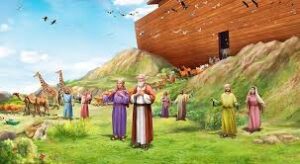Bring Out Every Kind of Living Creature
from the Ark so They Can Multiply on the Earth
8: 15-17
Bring out every kind of living creature from the ark so they can multiply on the earth DIG: How did the Flood affect Mrs. Noah? What similarities are there between Chapter 8 and Chapter 1? Were there any animals that died during their time on the ark? Were any born? What happened to the dinosaurs?
REFLECT: Do you need a fresh start with God in a certain area of your life? Are you full of hope today or full of despair? Where does the despair come from (John 10:10)? ADONAI is ready to guide and bless those who are faithful to Him! When was the last time you obeyed God’s Word and were saved from the heartache of sin?
Noah now takes his place as the head of the human race, the same position that Adam had. There was to be a new beginning, a fresh start, full of hope and with every divine guarantee of blessing. Sin had been punished, grace was working, and God was ready to guide and bless those through whom the earth was to be repeopled and ruled.156

A year and seventeen days earlier, ADONAI said to Noah, “Come into the ark, you and all your household” (7:1 NKJ). Now He says to Noah, “Come out of the ark, you and your wife and your sons and their wives” (8:15-16). This is the fourth of five times Mrs. Noah is mentioned in the Bible (6:18; 7:7 and 13, 8:16 and 18). The Flood brought deep personal loss for Mrs. Noah. The waters that covered the earth swept away the only world she had even known – the life Noah had worked so hard to build. Friends, relatives, her home, her community, and her way of life were all gone. Everything was lost. Like the Titanic in reverse, the world sank beneath the waves, and only the massive ark remained afloat. She faced the daunting task of starting over in her old age. It might be different if she were famous, or young. But she was neither.
These two commands are not conflicting, but complementary, reminding us of the two complementary commands of Jesus during His ministry here on earth: Come to Me, all you who are weary and burdened, and I will give you rest (Matthew 11:28). This command prepared the way for the great command: Go into all the world and preach the good news to all creation (Mark 16:15). The ark had been like a great sheep pen, with Messiah being pictured as the door, through whom the sheep will come in to be saved, but also go out and find pasture (John 10:9).
As stated earlier, the period after the Flood marks a new beginning for mankind. To emphasize this, the Holy Spirit has deliberately structured the new beginning in Chapters 8 and9 to coincide with the new beginning of Chapter 1.
In 8:1 God sent a wind over the earth, and in 1:2 the Spirit (the Hebrew word for Spirit and wind are the same) of Elohim was hovering over the waters.
In 8:2 the springs of the deep and the floodgates of the heavens had been closed, and in 1:7 God separated the water under the expanse from the water above it.
In 8:5 the waters continued to recede and the tops of the mountains became visible, and in 1:9 Elohim said: Let the water under the sky be gathered, and let dry ground appear.
Here in 8:17a God said: Bring out every living kind of creature that is with you – the birds, the animals, and all the creatures that move along the ground, and in 1:25 God made the wild animals, the livestock and all the creatures that move along the ground.
None were lost on the ark, but also, none were born. This is why I believe that many of the animals went into hibernation during the year that they were in the ark. It is not until it had rested that God said that the birds, animals and all the creatures that move along the ground should multiply on the earth and be fruitful and increase in number upon it (8:17b). Because the entire earth was open to them, and because of the lack of competition, this allowed the animal population to multiply very quickly. Each species kept searching until it found an ecological area for which it was better suited than the others.
What happened to the dinosaurs after the Flood? After the animals were released from the ark they began to repopulate the earth. The dinosaurs lived for at least a few centuries after the Flood, but probably never in the great numbers that there had once been. No one knows exactly when they finally died out. The earth was a very different place after the Flood. When Noah stepped off the ark, it must have felt like he was on another planet. Nothing looked familiar. All the landmarks were gone. The Garden of Eden was gone forever. Mud and rock were everywhere. Because the canopy that had enveloped the earth was gone, great thicknesses of snow and ice began to build up near the polar regions. These eventually formed ice sheets covering northern Europe and reaching down into the northern third of the United States. Because of this Ice Age, many parts of the world became too harsh for dinosaurs. No longer did the earth have the same great forest of huge nutritious plants. It would have been hard for the dinosaurs to locate enough food as they got bigger and bigger. All these changes probably caused the dinosaurs to die off.157



Leave A Comment